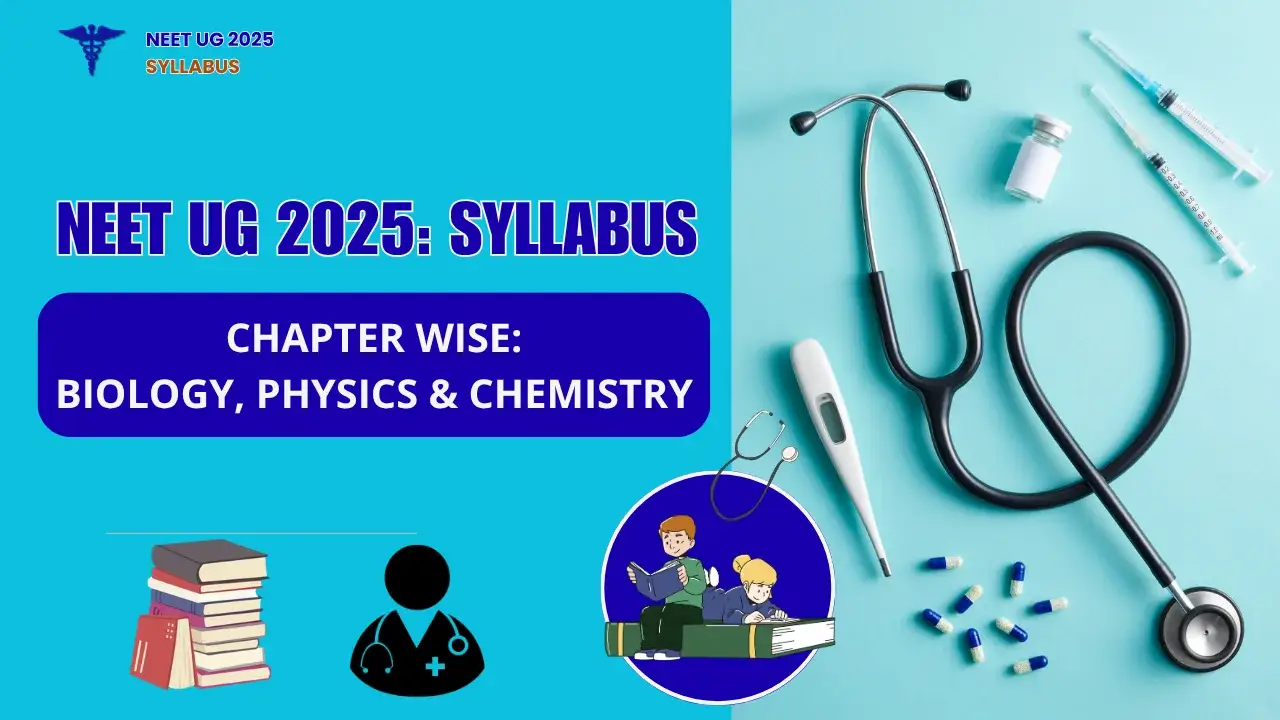NEET UG 2025 Syllabus with Weightage: Complete Biology, Physics & Chemistry Guide

Last Updated: August 4, 2025 at 3:10 pm
NEET UG 2025 Syllabus Overview
The NEET UG 2025 syllabus chapter wise has been significantly updated by NTA under NMC guidelines. The revised syllabus now includes 79 chapters instead of 97, with several topics removed across Physics, Chemistry, and Biology. Biology carries the highest weightage with 90 questions (360 marks), followed by Physics and Chemistry with 45 questions each (180 marks each).
The National Eligibility cum Entrance Test (NEET) UG 2025 represents a crucial milestone for aspiring medical students across India. With the National Testing Agency (NTA) releasing the updated syllabus under the National Medical Commission (NMC) guidelines, understanding the neet 2025 syllabus chapter wise has become more important than ever.
This comprehensive guide breaks down every aspect of the NEET UG 2025 syllabus, providing detailed chapter-wise weightage, removed topics, and strategic insights to help you excel in your medical entrance preparation.
What’s New in NEET UG 2025 Syllabus?
The neet physics syllabus 2025, chemistry, and biology sections have undergone significant changes. The total number of chapters has been reduced from 97 to 79, making the syllabus more focused and manageable for students.
Key Changes:
- Streamlined Content: Removal of redundant topics
- Updated Pattern: 180 questions instead of 200 (45 each from Physics and Chemistry, 90 from Biology)
- Reduced Duration: 180 minutes (3 hours) instead of 200 minutes
- No Optional Questions: All questions are now mandatory
📊 NEET 2025 vs Previous Years – Key Changes
🔄 NEET Evolution: 2024 vs 2025
📚 Total Chapters
18 chapters removed
⏱️ Exam Duration
20 minutes reduced
❓ Total Questions
All mandatory
📖 Focus Areas
Concept clarity
NEET Biology Important Chapters and Weightage 2025
Biology dominates the NEET examination, contributing 50% of the total marks. Understanding neet biology important chapters is crucial for securing a high percentile.
📊NEET 2025 Subject-wise Weightage Distribution
🎯 Subject Weightage & Strategy
BIOLOGY
PHYSICS
CHEMISTRY
NEET-Biology Class 11 Syllabus with Weightage
| Chapter | Expected Questions | Weightage (%) | Difficulty Level |
| The Living World | 1-2 | 2-3% | Easy |
| Biological Classification | 2-3 | 4-5% | Easy-Medium |
| Plant Kingdom | 2-3 | 4-5% | Medium |
| Animal Kingdom | 3-4 | 6-7% | Medium |
| Morphology of Flowering Plants | 2-3 | 4-5% | Easy |
| Anatomy of Flowering Plants | 2-3 | 4-5% | Medium |
| Structural Organisation in Animals | 2-3 | 4-5% | Medium |
| Cell: The Unit of Life | 3-4 | 6-7% | Medium-Hard |
| Biomolecules | 3-4 | 6-7% | Medium |
| Cell Cycle and Cell Division | 2-3 | 4-5% | Medium |
| Transport in Plants | 2-3 | 4-5% | Medium |
| Mineral Nutrition | 1-2 | 2-3% | Easy |
| Photosynthesis in Higher Plants | 3-4 | 6-7% | Hard |
| Respiration in Plants | 2-3 | 4-5% | Medium |
| Plant Growth and Development | 2-3 | 4-5% | Medium |
| Digestion and Absorption | 2-3 | 4-5% | Medium |
| Breathing and Exchange of Gases | 2-3 | 4-5% | Medium |
| Body Fluids and Circulation | 2-3 | 4-5% | Medium |
| Excretory Products and Elimination | 2-3 | 4-5% | Medium |
| Locomotion and Movement | 2-3 | 4-5% | Medium |
| Neural Control and Coordination | 3-4 | 6-7% | Hard |
| Chemical Coordination and Integration | 2-3 | 4-5% | Medium |
NEET-Biology Class 12 Syllabus with Weightage
| Chapter | Expected Questions | Weightage (%) | Difficulty Level |
| Reproduction in Organisms | 2-3 | 4-5% | Easy-Medium |
| Sexual Reproduction in Flowering Plants | 3-4 | 6-7% | Medium |
| Human Reproduction | 3-4 | 6-7% | Medium-Hard |
| Reproductive Health | 2-3 | 4-5% | Easy |
| Principles of Inheritance and Variation | 4-5 | 8-10% | Hard |
| Molecular Basis of Inheritance | 3-4 | 6-7% | Hard |
| Evolution | 3-4 | 6-7% | Medium |
| Human Health and Disease | 3-4 | 6-7% | Medium |
| Strategies for Enhancement in Food Production | 2-3 | 4-5% | Easy |
| Microbes in Human Welfare | 2-3 | 4-5% | Easy |
| Biotechnology: Principles and Processes | 2-3 | 4-5% | Medium |
| Biotechnology and its Applications | 2-3 | 4-5% | Medium |
| Organisms and Populations | 2-3 | 4-5% | Medium |
| Ecosystem | 3-4 | 6-7% | Medium |
| Biodiversity and Conservation | 2-3 | 4-5% | Easy |
| Environmental Issues | 2-3 | 4-5% | Easy |
NEET-Physics Syllabus 2025 with Chapter-wise Weightage
The neet physics syllabus 2025 covers fundamental concepts from both Class 11 and 12. Physics often challenges students due to its mathematical nature and conceptual depth.
NEET-Physics Class 11 Syllabus
| Chapter | Expected Questions | Weightage (%) | Difficulty Level |
| Physical World and Measurement | 1-2 | 2-4% | Easy |
| Kinematics | 2-3 | 4-6% | Medium |
| Laws of Motion | 3-4 | 6-8% | Medium-Hard |
| Work, Energy and Power | 2-3 | 4-6% | Medium |
| Motion of System of Particles and Rigid Body | 2-3 | 4-6% | Hard |
| Gravitation | 2-3 | 4-6% | Medium |
| Properties of Bulk Matter | 2-3 | 4-6% | Medium |
| Thermodynamics | 3-4 | 6-8% | Hard |
| Behaviour of Perfect Gas and Kinetic Theory | 1-2 | 2-4% | Medium |
| Oscillations and Waves | 2-3 | 4-6% | Medium |
NEET Physics Class 12 Syllabus
| Chapter | Expected Questions | Weightage (%) | Difficulty Level |
| Electrostatics | 3-4 | 6-8% | Medium-Hard |
| Current Electricity | 3-4 | 6-8% | Medium |
| Magnetic Effects of Current and Magnetism | 3-4 | 6-8% | Hard |
| Electromagnetic Induction and Alternating Currents | 2-3 | 4-6% | Hard |
| Electromagnetic Waves | 1-2 | 2-4% | Easy |
| Optics | 3-4 | 6-8% | Medium |
| Dual Nature of Matter and Radiation | 2-3 | 4-6% | Medium |
| Atoms and Nuclei | 2-3 | 4-6% | Medium |
| Electronic Devices | 1-2 | 2-4% | Easy |
Inorganic Chemistry
| Chapter | Expected Questions | Weightage (%) | Difficulty Level |
| Hydrogen | 1-2 | 2-4% | Easy |
| S-Block Elements | 2-3 | 4-6% | Easy |
| P-Block Elements | 4-5 | 8-10% | Medium |
| D and F Block Elements | 2-3 | 4-6% | Medium |
| Coordination Compounds | 2-3 | 4-6% | Medium |
| General Principles of Metallurgy | 1-2 | 2-4% | Easy |
Organic Chemistry
| Chapter | Expected Questions | Weightage (%) | Difficulty Level |
| Purification and Characterisation of Organic Compounds | 1-2 | 2-4% | Easy |
| Some Basic Principles of Organic Chemistry | 1-2 | 2-4% | Medium |
| Hydrocarbons | 2-3 | 4-6% | Medium |
| Organic Compounds Containing Halogens | 1-2 | 2-4% | Medium |
| Organic Compounds Containing Oxygen | 2-3 | 4-6% | Medium |
| Organic Compounds Containing Nitrogen | 2-3 | 4-6% | Medium |
| Polymers | 1-2 | 2-4% | Easy |
| Biomolecules | 2-3 | 4-6% | Medium |
| Chemistry in Everyday Life | 1-2 | 2-4% | Easy |
Removed Topics from NEET 2025 Syllabus
Understanding what’s been removed helps students focus their preparation more effectively. The NMC has removed several topics to streamline the curriculum:
Physics Removed Topics:
- Certain complex derivations in thermodynamics
- Advanced electromagnetic theory concepts
- Some portions of modern physics
Chemistry Removed Topics:
- Complex coordination chemistry mechanisms
- Advanced organic synthesis pathways
- Certain industrial processes
Biology Removed Topics:
- Some detailed plant anatomy sections
- Advanced biotechnology applications
- Certain ecological concepts
Read Also: Top 7 AI Tools Transforming Govt Job Preparation in India
NEET UG Preparation Plan 2025
Creating an effective neet ug preparation plan requires understanding the weightage distribution and focusing on high-scoring chapters.
📊12-Month NEET Preparation Timeline
📅 Your 12-Month Success Roadmap
PHASE 1: FOUNDATION
- Complete NCERT thoroughly
- Build strong concepts
- Focus on theory understanding
- Basic problem solving
PHASE 2: ADVANCED
- Previous year questions
- Topic-wise practice
- Mock test series
- Weakness identification
PHASE 3: MASTERY
- Intensive revision
- Daily mock tests
- Time management
- Formula memorization
Phase-1: Foundation Building (Months 1-6)
- Master NCERT textbooks completely
- Focus on neet biology important chapters like Genetics, Human Physiology
- Build strong conceptual base in Physics fundamentals
- Complete Inorganic Chemistry classifications
Phase-2: Advanced Preparation (Months 7-10)
- Solve previous year questions chapter-wise
- Take mock tests regularly
- Focus on weak areas identified through testing
- Practice numerical problems in Physics and Chemistry
Phase-3: Revision and Testing (Months 11-12)
- Intensive revision of all subjects
- Daily mock tests and analysis
- Focus on time management
- Review important formulas and concepts
Subject-wise Study Strategy
Biology Strategy
- Read NCERT line by line
- Create concept maps for complex topics
- Focus on diagrams and labeling
- Practice previous year questions extensively
Physics Strategy
- Understand concepts before memorizing formulas
- Practice numerical problems daily
- Focus on high-weightage chapters like Mechanics, Electrodynamics
- Use dimensional analysis for quick checks
Chemistry Strategy
- Memorize important reactions and mechanisms
- Create periodic table shortcuts
- Practice naming conventions in organic chemistry
- Focus on NCERT intext and end-chapter questions
📊High-Scoring Chapters by Difficulty Level
🎯 Chapter Priority Matrix: Score vs Difficulty
Target First! 🎯
- Biology: Biological Classification, Morphology
- Physics: Units & Measurement, Waves
- Chemistry: Periodic Table, Chemical Bonding
Focus Second! ⚡
- Biology: Genetics, Human Physiology
- Physics: Mechanics, Optics
- Chemistry: Organic Chemistry, Coordination
Master Last! 🔥
- Biology: Molecular Biology, Biotechnology
- Physics: Modern Physics, Thermodynamics
- Chemistry: Chemical Kinetics, Electrochemistry
Easy chapters
Medium chapters
Hard chapters
Revision cycles
Important Changes Under NMC Guidelines
The National Medical Commission has introduced several changes to align the NEET syllabus with current medical education needs:
- Competency-based curriculum: Focus on application rather than rote learning
- Reduced syllabus burden: Removal of less relevant topics
- Updated content: Inclusion of recent scientific developments
- Practical orientation: Emphasis on concepts applicable in medical practice
People Also Ask
Conclusion: Your Path to NEET Success
The updated NEET 2025 syllabus chapter wise presents both opportunities and challenges. With a more focused curriculum, students can achieve deeper understanding and better retention. Success in NEET 2025 requires strategic planning, consistent effort, and smart preparation aligned with the new weightage distribution.
Remember, the reduced syllabus doesn’t make the exam easier – it makes thorough preparation more crucial. Focus on understanding concepts, practicing regularly, and maintaining consistency throughout your preparation journey.
Ready to ace NEET 2025? Start your focused preparation today with our comprehensive study materials and expert guidance. Join thousands of successful NEET aspirants who transformed their medical dreams into reality!







